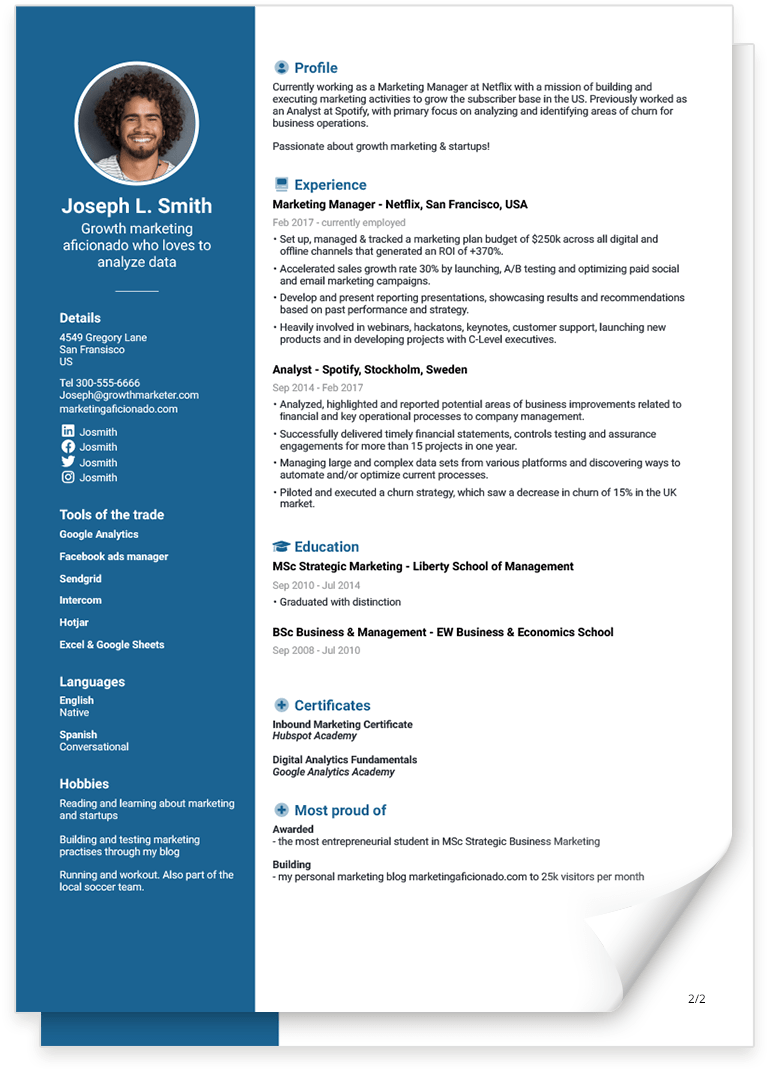Best Skills for a Resume in 2025 [List of Examples & How to]
![Best Skills for a Resume in 2025 [List of Examples & How to]](https://jofibostorage.blob.core.windows.net/blog/skills-for-resume.jpg)
“Which skills should I add to my resume? What are the most important skills for a resume?”
If you have tried to write just one resume in your life, you will have asked yourself these questions. And with good reason.
Your skills are important. And how you apply your skills to your resume is important. So important in fact that most recruiters, and Applicant Tracking Systems, will be on the lookout for the exactly right skills.
Thus, having a skills section in your resume is a must nowadays. And it is very important to treat this section with great care and an eye for detail. But don’t worry, we will be there to help you along the way.
This guide will cover the following headlines regarding skills for a resume:
- What are the best job skills to put on a resume?
- Hard skills and soft skills - what is the difference?
- 56 hard skills to put on a resume
- 56 soft skills to put on a resume
- How do I choose which skills to put on my resume?
- How do I list my skills on my resume?
- Skills for resume without extensive experience
- Skills for specific jobs
Click on the headline you want to jump to or read the whole guide by continuing below.
What are the best job skills to put on a resume?
We’ve listed some of the best job skills that employers are looking for right now. You will find that they are a mix of both soft skills and hard skills.
- Data analysis
- Problem solving
- Collaborative
- Detail oriented
- Adaptable
- Creative
- Written communication
- Public speaking
- Critical thinking
- Bi-lingual
- Multi-tasking
- Organized
- Interpersonal skills
- Time management
- Accountable
- Leadership
- Results oriented
- Project management
- Budgeting
- Compassionate/ empathetic
Hard and soft skills - what is the difference?
When it comes to skills for a resume there are several types to choose from. The two types we will focus on in this article are hard skills (also sometimes referred to as technical skills) and soft skills.
Below are the definitions for each of these.
56 hard skills to put on a resume
Let’s start with the hard skills.
They are called hard skills because they are both hard to come by and they are also (often) measurable. These are the skills that you acquire in a classroom or during training courses. In other words, they are teachable.
Another aspect of the hard skills is that they are rarely transferable to other job categories.
For example, let’s say you are a software developer. During your education towards becoming a skilled software developer you will have learned a specific set of skills. These skills will not be transferable if you want to change your professional direction towards, let’s say, becoming a truck driver. Being a truck driver demands a whole different set of hard skills (or technical skills if you like) than a software developer or a customer service representative for that matter. This is what non-transferable skills means.
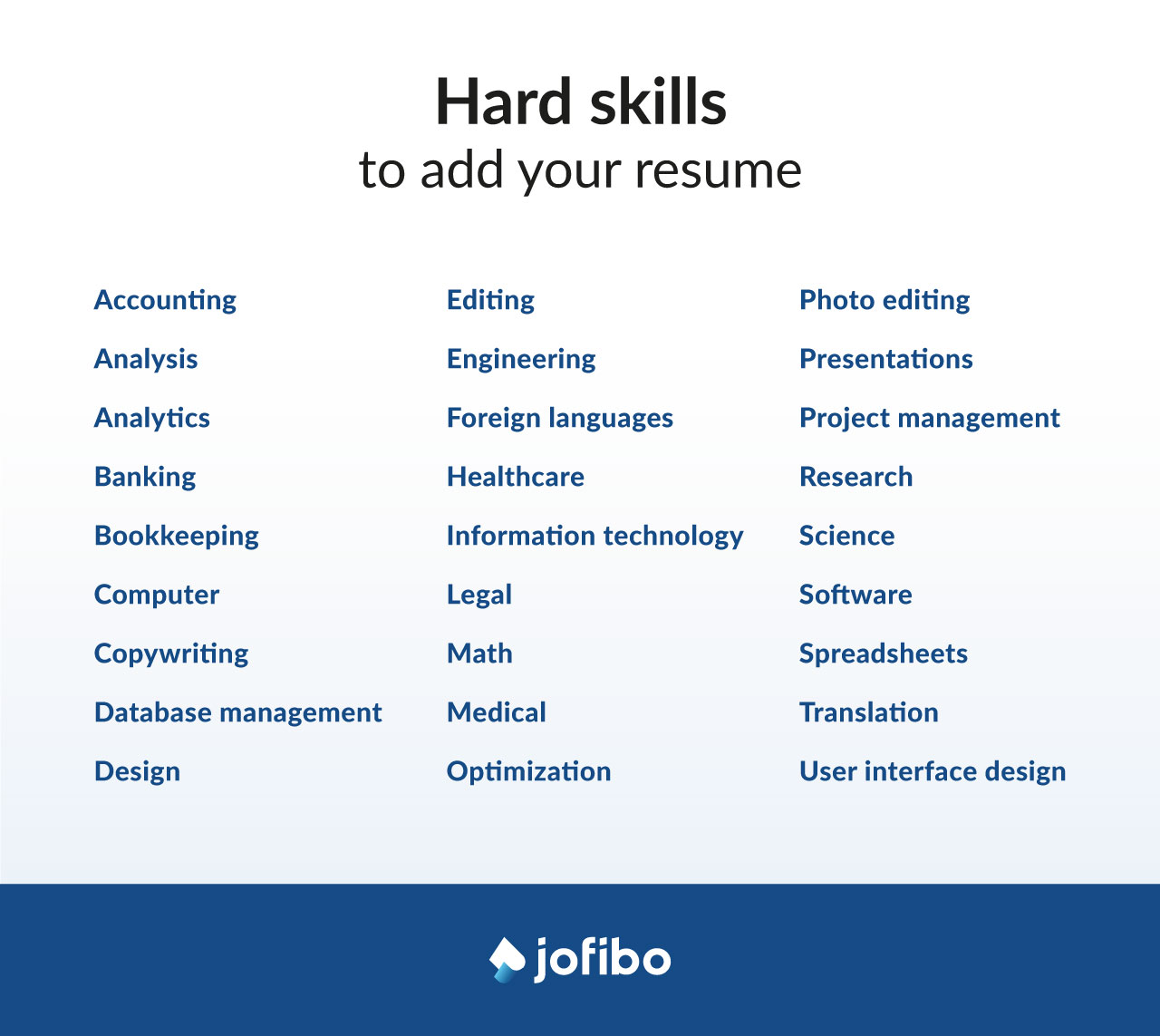
Examples of hard skills
- Accounting
- Administrative
- Analysis
- Analytics
- Automotive
- Banking
- Bookkeeping
- Carpentry
- Computer
- Computer troubleshooting
- Construction
- Copywriting
- Data
- Database management
- Data mining
- Design
- Diagnostics
- Editing
- Electrical
- Engineering
- Financial
- Foreign languages
- Hardware
- Healthcare
- Information technology
- Languages
- Legal
- Macro/micro economics
- Manufacturing
- Math
- Mechanical
- Medical
- Nursing
- Optimization
- Pharmaceutical
- Photo editing
- Pipefitter
- Presentations
- Plumbing
- Project management
- Programming (HTML/CSS/Javascript)
- Research
- Reporting
- Science
- Server maintenance
- Software
- Spreadsheets
- Teaching
- Technology
- Testing
- Translation
- Transcription
- User interface design
- Video editing
- Word processing
- Writing
56 soft skills to put on a resume
Soft skills, on the other hand, are not (usually) taught. Think of them as a combination between your interpersonal skills, social and emotional intelligence, your personal character traits, and social skills.
It is your soft skills that allow you to navigate in your environment, both professionally and privately. They are the skills that enable you to collaborate successfully with your colleagues.
Soft skills cannot be taught in a classroom (you are either born with them or you don’t possess them). They are highly transferable and can determine if you are suited for a position or not.
For instance, can you learn how to be more patient? No, you are either a patient person or you are not. And there is no right or wrong here. Being patient is a great soft skill if you are a kindergarten teacher. But if you are managing a team with a very strict deadline, too much patience might not be desirable.
As you can tell, the soft skills are a bit fussier than the hard skills. They are no less important though since they are an integral part of who you are and how you interact with your potential colleagues. So they are important to know.
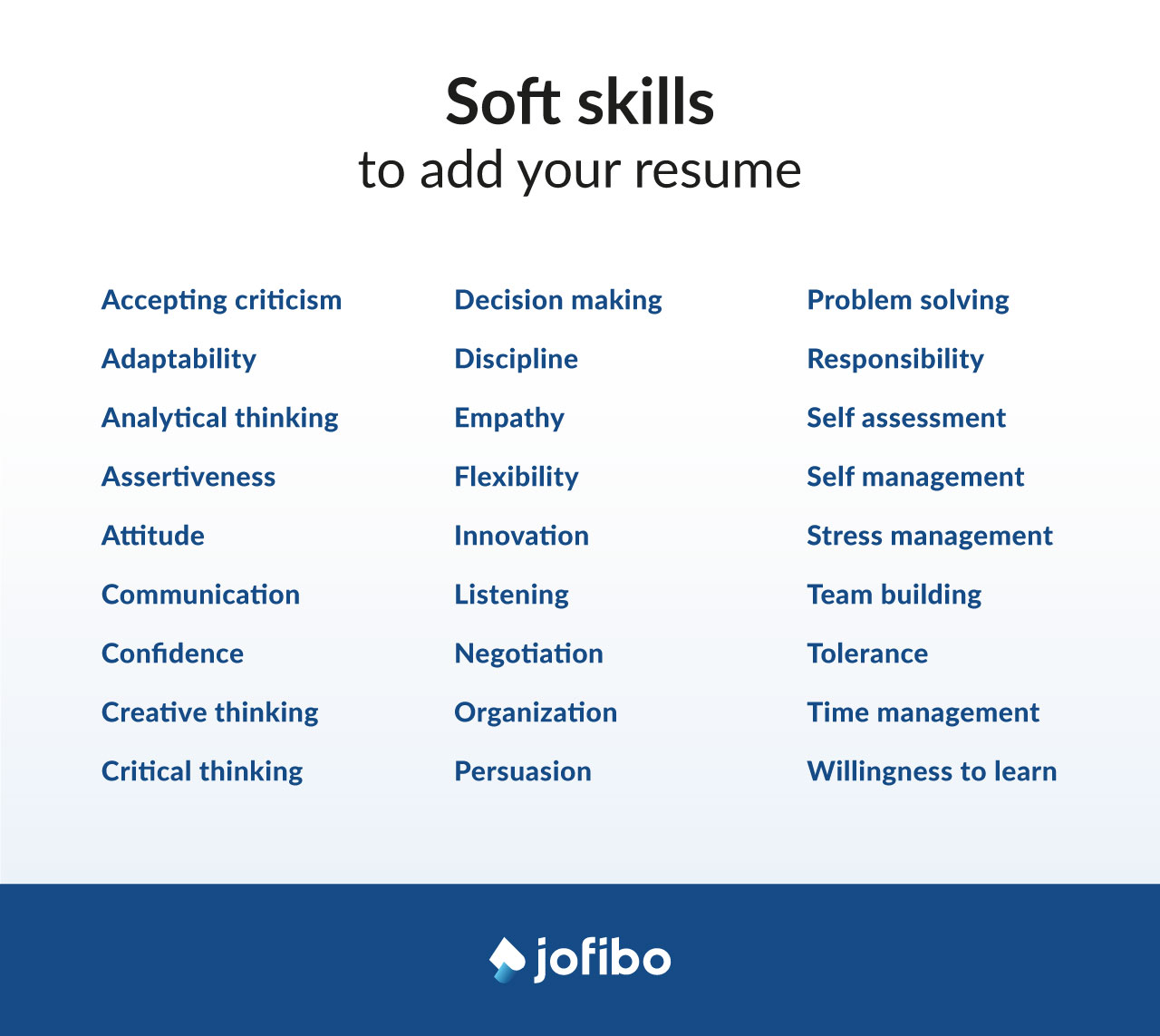
Examples of soft skills
- Ability to work independently
- Accepting criticism
- Accuracy
- Adaptability
- Aesthetics
- Analytical thinking
- Artistic sense
- Assertiveness
- Attention to detail
- Attitude
- Commitment
- Communication
- Competitiveness
- Confidence
- Conflict resolution
- Creative thinking
- Creativity
- Critical thinking
- Customer service
- Decision making
- Deductive reasoning
- Discipline
- Emotional intelligence
- Empathy
- Enthusiasm
- Flexibility
- Honesty
- Innovation
- Intercultural competence
- Listening
- Motivation
- Negotiation
- Networking
- Organization
- Patience
- Persuasion
- Planning
- Positivity
- Problem solving
- Public speaking
- Responsibility
- Scheduling
- Self assessment
- Self control
- Self management
- Sociability
- Stress management
- Task delegation
- Team building
- Teamwork
- Tolerance
- Troubleshooting
- Time management
- Visual communication
- Willingness to learn
- Work ethic
How do I choose which skills to put on my resume?
Choosing the right skills to put on a resume is crucial to get past both screening bots (ATS) and the recruiter’s famous 6 seconds scan. But how do you choose the right skills for your resume?
Well, first of all you need to create a master list of all your skills.
The good news is, you will only need to do this once. Then you can pick and choose from it for each resume that you make.
After that it’s all a matter of matching your skills, both soft skills and hard skills, to the job ad. Go through the job ad very carefully and highlight all the skills that are required. This process is very similar to adding power words to your resume.
Now, note down all the skills you’ve highlighted from the job ad and see, with which of your own skills there is an overlap.
You might have to change the wording of your skills to match the ones the job ad mentions exactly (this is very important due to the ATS bots scanning your resume). For example, if one of your hard skills is graphic design but the job ad says web design, you should go ahead and write web design instead. It’s all a matter of customizing your resume to the job description you’re targeting.
How do I list my skills on my resume?
Okay, so now that we’ve covered the basics and uncovered your skill sets, it’s time to get hands on. How (and where) should you list your skills on your resume?
You have a few options and we strongly recommend you use all of them when you write your resume.
However, the first thing you must do is analyze the job ad to find out exactly which skills and qualifications they require for the position.
Let’s look at an example. Imagine you’re a Customer Service Representative and you want to apply for a job with the job description below:
We are looking for a customer-oriented service representative.
Responsibilities will include:
- Manage large amounts of incoming phone calls
- Keep records of customer interactions, process customer accounts and file documents
- Identify and assess customers’ needs to achieve satisfaction
- Help customers with technical issues such as cancellations
- Provide accurate, valid and complete information by using the right methods/tools
- Handle customer complaints, provide appropriate solutions and alternatives within the time limits; follow up to ensure resolution
- Assist C-suite monitor the general customer satisfaction level
Skills and qualifications include:
- Proficient in at least two languages
- Proven customer support experience or experience as a Client Service Representative
- Familiarity with CRM systems and practices
- Strong phone contact handling skills and active listening
- Customer orientation and ability to adapt/respond to different types of characters
- Excellent communication and presentation skills
The highlighted parts here are the skills and qualifications that the company is looking for in a candidate. It’s important to note that according to studies companies most often accept (and hire) candidates that can say yes to 80% of the requirements so you don't have to be able to tick off all the boxes.
Now that you know exactly which skills to focus on we can move on to how you list your skills on your resume.
1. List your skills in a separate skills section
When you list your skills in a separate skills section in your resume, you automatically help the recruiter immediately see which skills you bring to the position.
A skills section is very suitable for your hard skills or technical skills. Make sure to be specific: Instead of writing “Support system skills”, use terms such as “Freshdesk” and “Jira Service Desk”.
Like so:
Skills at the bottom
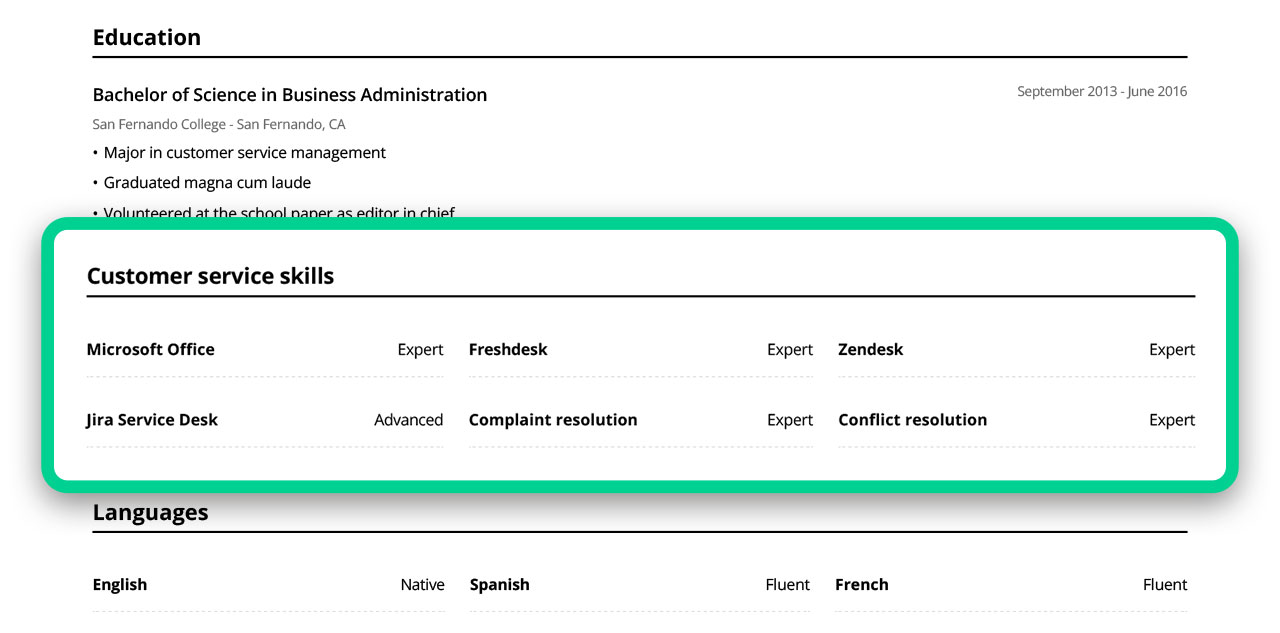
Skills on left side column
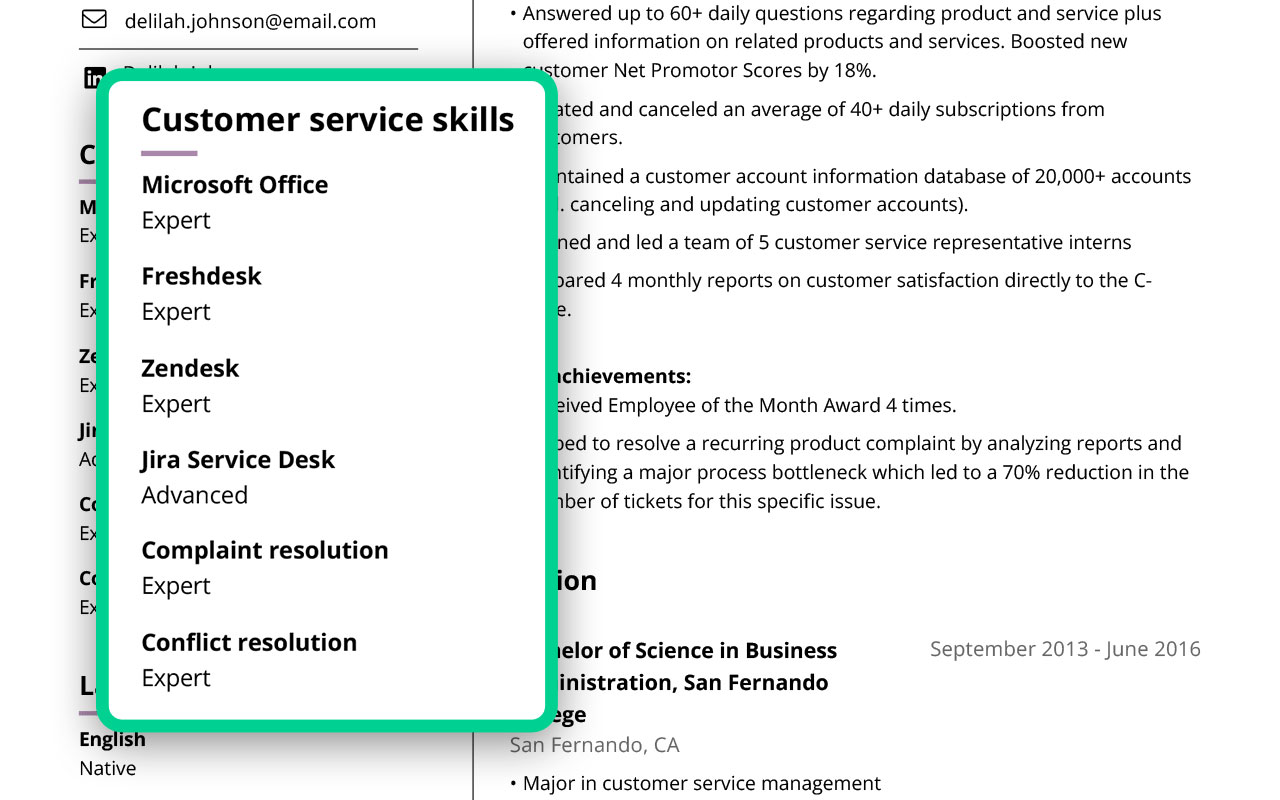
Make sure that you only add the skills that are relevant to the job position. And don’t add more than 10 skills to your skills section.
2. Add your work related skills in your work history
However, it’s not enough to just list your skills in a skills section. You also need to be able to show how you’ve used your skills in real life professional situations. You do that by implementing your skills in your work history. Here’s how:
- Read the job description carefully and note down all the places that resemble requirements or key skills.
- They could be words such as “excellent communication skills”, “ability to think critically”, “knowledge of XXX software” and so on.
- Now, compare those words with your skills from your master list. The ones that match the skills in the job ad go on your resume.
Here is an example:
Customer Service Representative - FlixFilms Inc.
San Fernando, CA
January 2016 - Present
- Answered up to 60+ daily calls regarding product and service plus offered information on related products and services. Boosted new customer Net Promotor Scores by 18%.
- Created and canceled an average of 40+ daily subscriptions from customers.
- Maintained a customer account information database of 20,000+ accounts (incl. canceling and updating customer accounts).
- Trained and led a team of 5 customer service representative interns
- Prepared 4 monthly reports on customer satisfaction directly to the C-suite.
Key achievements:
- Helped to resolve a recurring product complaint by analyzing reports and identifying a major process bottleneck which led to a 70% reduction in the number of tickets for this specific issue.
If you want to nail your work experience section I definitely recommend that you check out the STAR method. With this method you can structure your descriptions and bullets in a way that lets the employer know exactly what you can contribute with in the organization.
3. Include your most prominent skills in your resume profile
The first thing a recruiter sees on your resume is the resume profile - or resume summary if you prefer. So you should definitely add your most prominent skills here.
We’ll continue with the Customer Service Representative job ad from before. The job ad called for skills in:
- Proficient in foreign languages
- Focused on customer satisfaction
- Skilled in the use of support tools and software
Check out the resume profile example below:
“Patient and engaging trilingual (1) customer service representative with more than 6 years of experience responding to all types of inquiries. Proven results within customer satisfaction with a score of 98% positive feedback (2) from customer surveys. Eager to join Phoenix Virtual Solutions to help grow customer loyalty and maintain the high standard of customer service. Expert user of Jira Service Desk and Freshdesk among other support tools (3)”
This candidate is already winning because it is clear that he or she possesses the skills that are highlighted in the job ad.
Skills for resume without extensive experience
If you are fresh out of school, or if you don’t have extensive experience in the field you’re applying for a job in, you will need to go about your resume a little differently. In this case it’s a good idea to put a lot of emphasis on your skills, especially your transferable skills. .
You do this by creating either a functional resume or a hybrid (combination) resume (our recommendation goes to the latter).
When putting your skills on a functional or a hybrid resume, you will have to create a skills summary section. Here you type in your skills and don’t forget to describe how these skills transfer to the job you’re applying for.
Here is an example of a functional resume with a skills summary. Note, that it is listed as the first section right after the resume profile text.
Resume with skills summary section
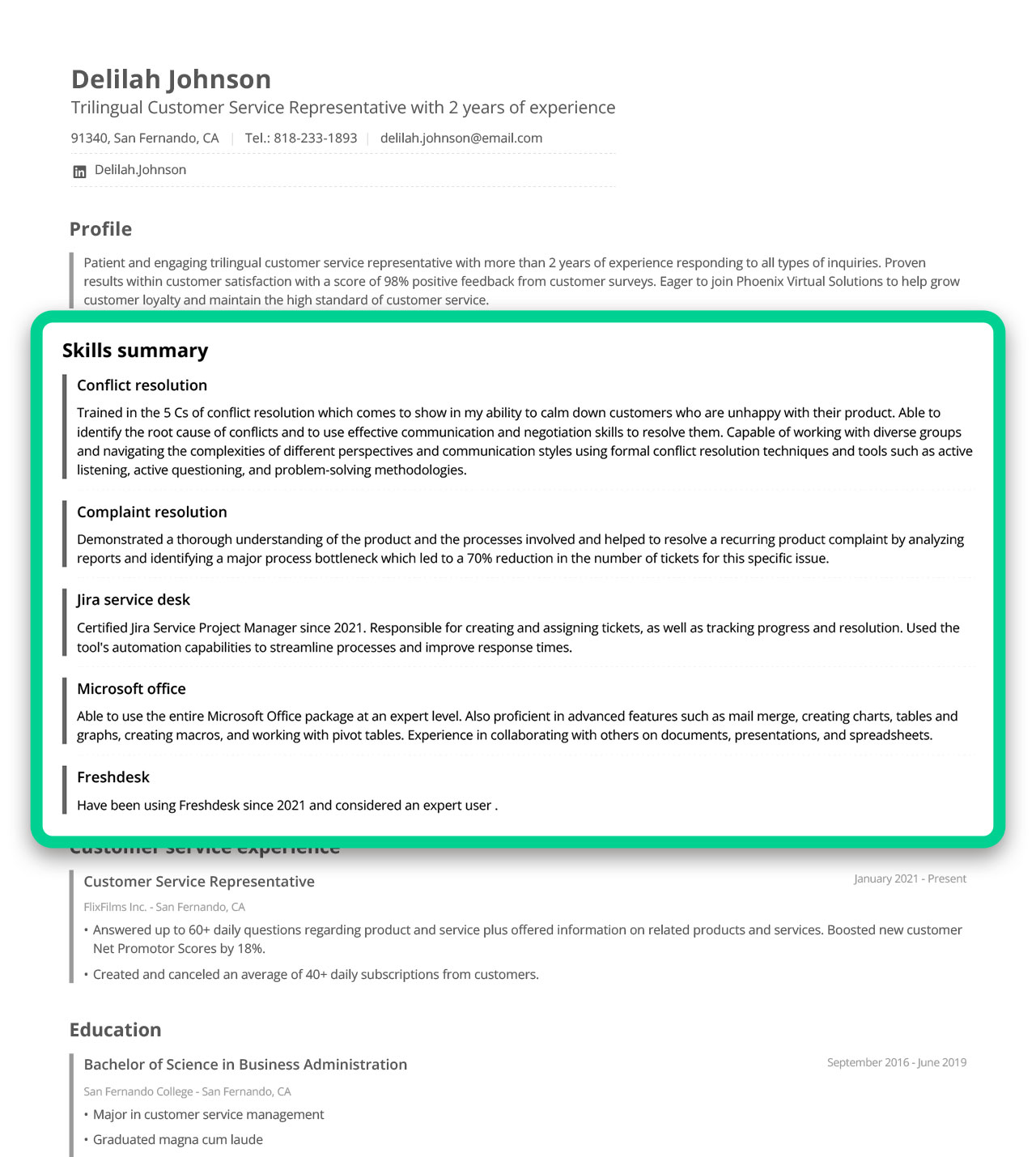
Skills for specific jobs
When you add your skills to your resume the general rule is, the more specific you are, the better. That’s why we’ve collected some of the most common skills for different careers below.
Teacher skills
Being a teacher no doubt demands that you possess a certain skill set. Not least within your subject. But there are also some general skills that you will need in order to be a successful and effective teacher:
- Lesson planning
- Instructional skills
- Organizational skills
- Classroom management
- Effective discipline
- SMART board interactive displays
- Standardized testing
- Software (e.g., Haiku Learning, Edmodo)
- Subject knowledge (depending on the field of expertise)
- Knowledge of curriculum and state standards
- Sense of humor
- Rapport with students
- Creativity
- Teamwork skills
- Critical thinking
- Decision making
- Leadership
- Problem solving
- Time management
Marketing manager skills
As a marketing manager you will need to know a lot about what drives customers to buy your product. For that you will need a wide range of skills.
Here are the skills that will work wonders on your resume:
- CRM: Salesforce, Microsoft Dynamics, Pipedrive, HubSpot
- Web Analytics: Adobe Analytics, Mixpanel, Heap, Google Analytics
- General Tools: Google Sheets/ Docs/ Slides, Microsoft Excel/ Word/ Powerpoint
- Optimization: customer segmentation, attribution modeling, A/B testing
- Paid Ads: AdWords, LinkedIn, Google Display Network, retargeting, Facebook
- Social Media: Instagram, Facebook, LinkedIn, Twitter
- Email Marketing: ConvertKit, Drip, Mailchimp
- SEO: keyword research, backlink building, content creation
- Direct Mail
Front End Developer skills
A front end developer is the person who implements web designs through coding languages like HTML, CSS, and JavaScript. They are some of the most in-demand roles out there. We’ve listed some of the most essential skills for a front end developer here:
- HTML/CSS
- JavaScript/jQuery
- Frameworks
- Responsive design
- Version control/Git
- Testing/debugging
- Browser developer tools
- Web performance
- CSS preprocessing
- Command line
Electrician skills
An electrician’s skills consist of a wide range of both hard and soft skills. The following are some of the most common skills mentioned for electricians.
- Calibrating level, pressure, temperature, and flow measuring systems
- Commercial experience
- Construction experience
- Conducting 3-phase motor replacement
- Conducting systems tests
- Accuracy
- Analytical skills
- Analyze blueprints
- Applying knowledge of programmable logic controls
- Carefully evaluating risks
- Dependability
- Good communication skills
- Independent problem solving
- Time management
- Attention to detail
- Mechanical aptitude
- Business skills
- Customer service skills
Secretary skills
A secretary is an essential part of any company. Without someone to keep track of administration and meetings a company would fall apart. Here are some of a secretary’s most important skills.
- Executive and administrative support
- Meeting and event planning
- Office management
- Training and supervision
- Customer relations and communications
- Records management
- Bookkeeping
- Multi-tasking
- MS Office (Word, Excel)
Cashier skills
The ability to manage time and provide great customer care is a core function of a cashier. Other top skills include:
- Cash register use
- Point of sale systems (POS)
- Merchant processing
- Scanner use
- Microsoft Office Suite
- Bookkeeping software
- Creating receipts
- Credit cards
- Exchanging purchases
- Inventory software systems
- Product knowledge
- Sales
- Customer service
- Accepting payments
- Integrity
- Basic math
- Attention to detail
- Accuracy
- Bagging calculations
- Cash management
Nursing skills
As a nurse you are often the link between the doctor and the patient. This requires a very special skill set besides your hard skills as a nurse. Below are some of the most sought-after skills a nurse can possess.
- Nursing supervision
- Care plan consulting
- Quality assurance
- Patient advocacy
- RN training and mentorship
- Clinical data analysis
- Change management
- Best practise development
- Excellent communication skills
Sales associate skills
A sales associate needs to be able to navigate in the interaction between them and many different customers. This requires both interpersonal and hard skills. Some top skills for a sales associate are:
- Communication and interpersonal skills when interfacing with customers
- CRM or POS software
- Customer-centric mindset
- Deep knowledge in product or inventory
- Creative problem solving and decision making
- Empathic attitude
- Ability to adapt and prioritize across multiple tasks
- Ability to handle unexpected situations
- Active listening and trust-building
- Basic math and money handling
- Time management
- Ability to learn quickly and accept feedback
- Retail sales experience
- Personal autonomy
- Persuasiveness
Truck driver skills
Great and reliant truck drivers will always be in high demand. Check out some of a truck driver’s top skills below.
- Time management
- Clear communication (written and verbal)
- Problem solving
- Customer service
- Flexible
- Good navigation skills
- Safe driving
- Focus
- Responsibility
- Math skills
- Technical skills
- Physical skills
Security guard skills
As a security guard you need to be able to navigate between being a person of authority and at the same time service minded. The top skills for a security guard are:
- A polite, calm and reasonable approach
- Good communication skills
- Spontaneity
- Ability to solve problems quickly and efficiently
- Good observational and monitoring ability
- Ability to follow instructions
- Technical knowledge of security systems
- A high level of physical strength and fitness
- Alertness
- Honesty
- Leadership skills
Key takeaways
We hope you’re feeling confident about putting your skills on your resume in a professional manner. The key takeaways from this article are:
- Create a master document of all your skills, both hard and soft
- Pick and choose skills for each resume you create to customize it to the job description you’re targeting
- Re-write your skills when necessary to target the ATS
- Be specific when you describe your skills
- Add your skills both in a skills section, in your work history and in your profile text
- A skills summary section might be a good idea if you don’t have a lot of professional experience yet
![Truck Driver Resume Sample [Guide]](https://jofibostorage.blob.core.windows.net/blog/truck-driver-resume-example-header.png)
![How to Choose the Best Resume Format [+Examples]](https://jofibostorage.blob.core.windows.net/blog/Resume-format.guide-cover.png)
![The CV Format Recruiters Hate [examples]](https://jofibostorage.blob.core.windows.net/blog/the-cv-resume-format-recruiters-hate_top.jpg)
